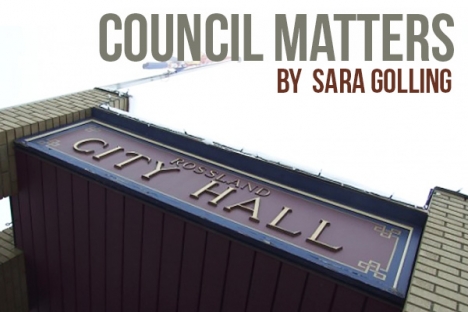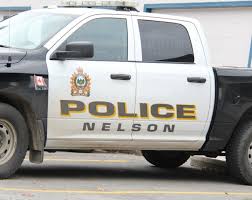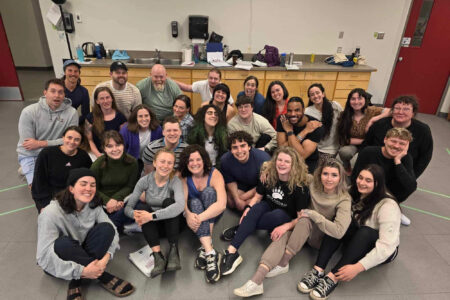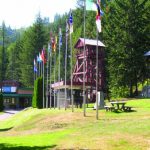Tax rate; how should cannabis be sold; how many councillors? and, local citizen honoured.
Rossland City Council Meeting, October 23, 2017
Present: Mayor Kathy Moore, and Councillors Lloyd McLellan, Andy Morel, John Greene, and Marten Kruysse. Absent: Andrew Zwicker and Aaron Cosbey.
Public Input Period:
1. Rossland Dispensary owner Jeff Weaver spoke about the coming decriminalization of cannabis by the federal government, and the development of regulations by the provincial government on distribution and retail systems. Weaver said the fears expressed by some people about a dispensary in Rossland have not materialized, and assured Council that whatever regulations are enacted, he will comply with them. He invited members of Council to visit the dispensary and ask questions if they have any.
Moore noted that Council has received little input on his business, and most of that has been positive.
2. Mike Kent of the Rossland Youth Action Network updated Council on progress at the youth space at the Emcon lot building, reported tht YAN is going ahead with programming, and requested other spaces for some of the youth groups (the Rossland Youth Service group, the Creating a Supportive Rossland group) to meet in until the building is ready for occupancy. Moore pointed out the YAN is “part of the City,” as is the Heritage Commission and the Sustainability Commission.
Delegations:
1. Craig DeLong of the Kootenay Outdoor and Environmental Learning Society (KOEL, which DeLong pronounces “cool”) spoke about a proposed grant submission to the Federation of Municipalities for an Energy and Greenhouse Gas Emissions Reduction Feasibility Study. DeLong is a member of Rossland’s Sustainability Commission and its Energy Task Force; he has “a keen interest in helping communities reduce their environmental impacts and helping citizens develop a respect for nature.” KOEL is a non-profit society designed to do those things.
The idea behind the grant application is to “develop a tool to assist building owners in reducing energy use and associated carbon footprint” and to “obtain more detailed information on the potential of alternate energy sources.” DeLong provided more detailed information on what those things mean.
DeLong was seeking support from Council for the application; that support would be in the form of a letter of support, and a commitment to provide at least 10% of the cost of the project ― the amount of the grant being sought ― in either money, or in-kind assistance. DeLong pointed out that if Rossland supported the idea, he could go to other local communities who could also benefit from the work proposed, and seek contributions from them to help make up the required 10%.
2. Lauren Rethoret and Jennifer Ellis of the Columbia Basin Rural Development Institute presented and summarized a 25-page report on the findings of the State of Climate Adaptation Assessment.
The climate is changing in Rossland as well as in the rest of the world. Average annual temperatures in Rossland have risen by 3.6 degrees C. since 1979 (no records were kept here before that). Rossland is experiencing more hot days in a year during the summer, and more “freeze-thaw” days in the winter. The number of wildfires in our region is increasing.
Earlier spring melts can mean lower water levels in streams, and in reservoirs, later in the year; but Rossland has no stream-flow monitoring on its water supply creeks, although the Sustainability Commission’s Water Stewardship Task Force (disbanded when the City joined the CBT WaterSmart program) recommended flow monitoring back in 2010.
Ellis and Rethoret noted that Rossland has taken steps toward water conservation and reducing interface wildfire hazard, and by preparing an emergency preparedness plan. They noted that only 9% of Rossland’s interface forested areas have been treated by FireSmart, so there is ample opportunity to extend that work; they also noted that more residents could put together more complete emergency preparedness kits.
Agenda item moved up:
Moore brought forward the agenda item dealing with Council’s draft letter to the provincial government in response to its request for input on cannabis regulation.
Council members agreed with the recommendations in the draft letter, except that Lloyd McLellan and Andy Morel argued that the letter should recommend that medical and recreational retail sources of cannabis should be separate. Jeff Weaver thinks there should be just one retail source for cannabis, for both recreational or therapeutic purposes. He expressed concerns about product testing and quality control, and said he thought a private distribution model is the only one that will allow for “the sensitivity, and the training, that’s required to administer advice.” Moore noted that “the farther it [control of a service] gets away from the people you’re serving, the [less satisfactory] it gets.” But Council voted to include a recommendation for separate retailing systems for recreational and therapeutic cannabis.
Policy Review:
Council is making a practice of reviewing City policies at each meeting; this time, a motion CARRIED unanimously to amend the Surplus and Reserve Policy to include the Climate Action Reserve Fund, and provisions to create an additional reserve bylaw for the regional sewer utility ― because sewage flows can vary substantially from year to year, and having a reserve fund for higher-flow years will make financial planning easier.
Then Council voted unanimously to confirm the Tangible Capital Asset Policy, and then the Emergency Operations Centre Wage Reimbursement Policy.
Development Permit Variance Application: 2042 Columbia Avenue
A motion to approve the application to vary the Building Bylaw #1978 requirement for sprinklers for renovations to 2042 Columbia, which is being renovated following a fire, CARRIED with only Kruysse opposed. Councillors mentioned that the application seemed “a bit ironic.” Council is agreeing to requests such as this one because at the end of this year, any municipal requirements that go beyond those in the provincial Building Code will be null and void. The provincial building code does not require sprinklers for this building.
Strata Conversion Request: 1960 Kootenay Avenue
Council unanimously CARRIED a motion to approve the strata conversion request for this duplex. During discussion, there was some concern about losing rental units, but the tenants in both sides of the duplex intend to purchase the units once the conversion is complete. If the new owners wish to rent them out in future, they can.
UBCM Age-Friendly Grant Program:
A motion to support an application for a grant of $25,000 to complete an Age-friendly Assessment, and if successful in obtaining the grant, to contract the Whistler Centre for Sustainability to complete the assessment, CARRIED unanimously.
Should Rossland have fewer Council members?
At Moore’s request, staff had provided a list of the actions needed to reduce Rossland City Council from seven members to five, and the necessary timeline. Staff sought further direction from Council on the issue.
In discussion, Council noted that if there were only five council members, a quorum would require only three to make decisions for Rossland. CAO Bryan Teasdale noted that during the summer, getting quorum for meetings is more difficult with only five council members.
Greene said he thinks the seven-member council works well, and provides better representation for Rossland’s diverse population. “If it ain’t broke, don’t fix it,” he commented. McLellan thought a five-member council would be fine, so he made a motion to initiate the reduction process. He thought a five-member council might result in a deeper sense of responsibility and involvement on the part of each councillor. McLellan also noted that this council has been very good about involving the community in decisions, and councils which do that shouldn’t require as many representatives on council. Kruysse agreed with him.
Moore had looked up a number of municipalities with populations comparable to Rossland’s, and noted that Creston, Oliver, Golden, Osoyoos, Smithers, and Tofino (which is smaller than Rossland) all have seven councillors. She was concerned that the workload of representation and liaison might be too heavy with only five council members.
The motion FAILED with only McLellan and Kruysse in favour.
Progress on Bylaws:
Motions to adopt the Business Licence Bylaw and the Zoning Amendment Bylaw (for short-term rentals) both CARRIED unanimously.
A motion to give third reading to the Noxious Weed Bylaw, which currently deals only with knotweeds, CARRIED unanimously.
Budget — that is, City Taxes:
Taxes: always a hot topic. Council did two things about the budget for the coming year: after a deal of discussion, they PASSED a motion authorizing a municipal tax increase for 2018 of 4.8%, coupled with a much lower increase for 2019 of only 1.25%. Only Kruysse voted against it.
Then, after passing that motion, Council passed two separate motions to defer projects that were in the budget for 2018; taken together, the two deferred projects would lower the budget for 2018 sufficiently to make the necessary tax increase lower by about 1%. The deferred projects were: the Trail Masterplan, and a professional review of the Design Review Panel Guidelines.
(Readers should note that the tax rate for 2018 is not yet a “done deal.”)
Kruysse made a motion to not fund the RDI Climate Adaptation Indicator monitoring, but Teasdale pointed out that those indicators are very valuable to Rossland’s staff for infrastructure planning. The motion FAILED, with only Kruysse and Greene voting in favour.
Member Reports: an honour awarded
Greene reported on Rosslander Kim Deane being awarded a Senate of Canada 150 medal; these awards were given to “Canadians who are thoroughly involved in their communities, whose generosity, dedication, volunteerism and hard work make Canada a better place to live.” Greene had announced this award at the Canada 150 celebration at Booty’s Cabin in the Rossland Range Recreation Site, but not everyone attending could hear his speech, in which he listed some of Kim Deane’s many contributions to Rossland and the region as a whole.
Other council members reported, and Council recessed to an in camera session just before 9:00 pm.
Strolling home in the dark, your reporter contemplated the fact that the next municipal elections are now less than one year away, and wondered which well-informed, principled, public-spirited, skilled decision-makers will step up to the plate to stand for election to our City Council for the next term.
























